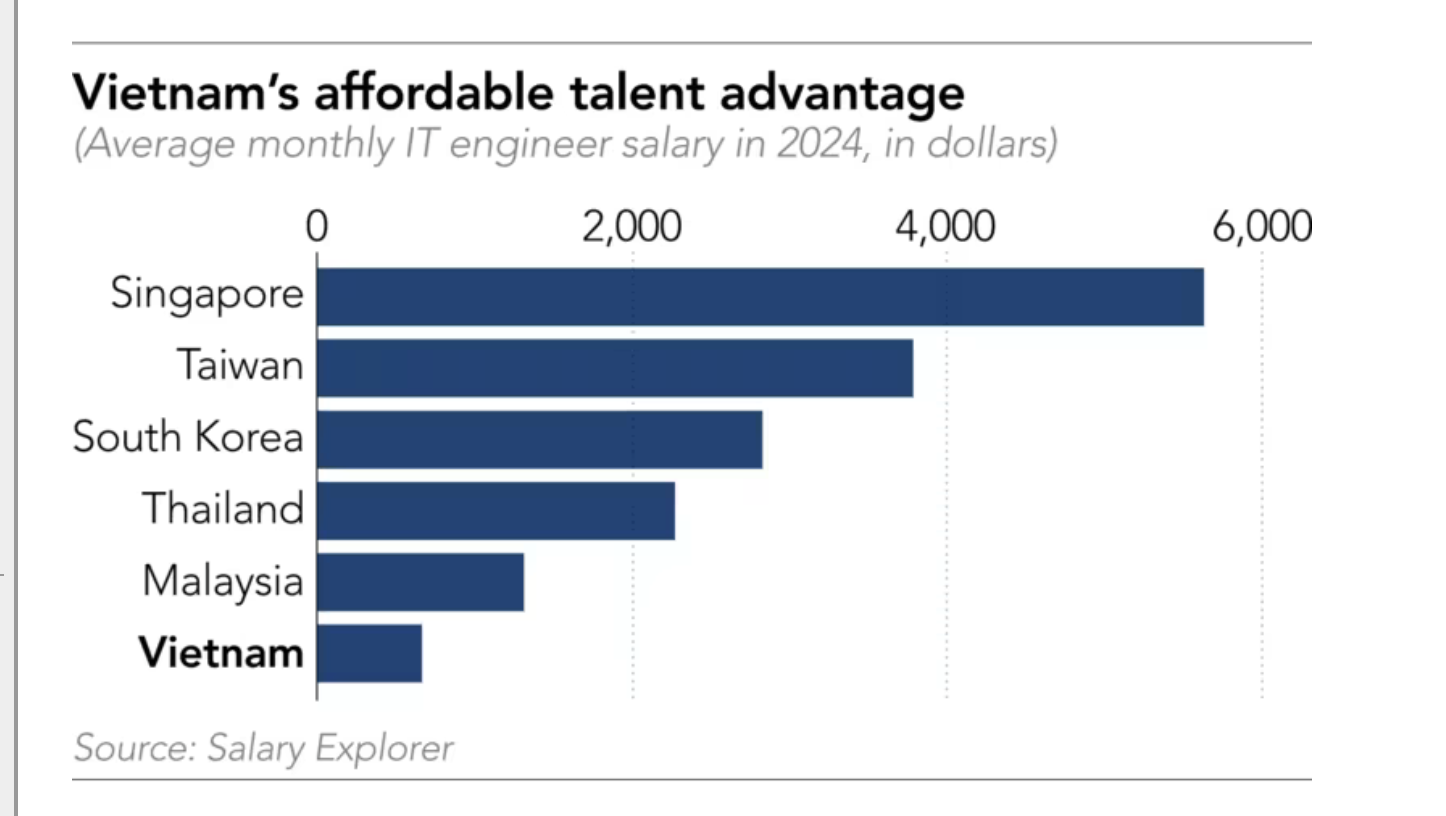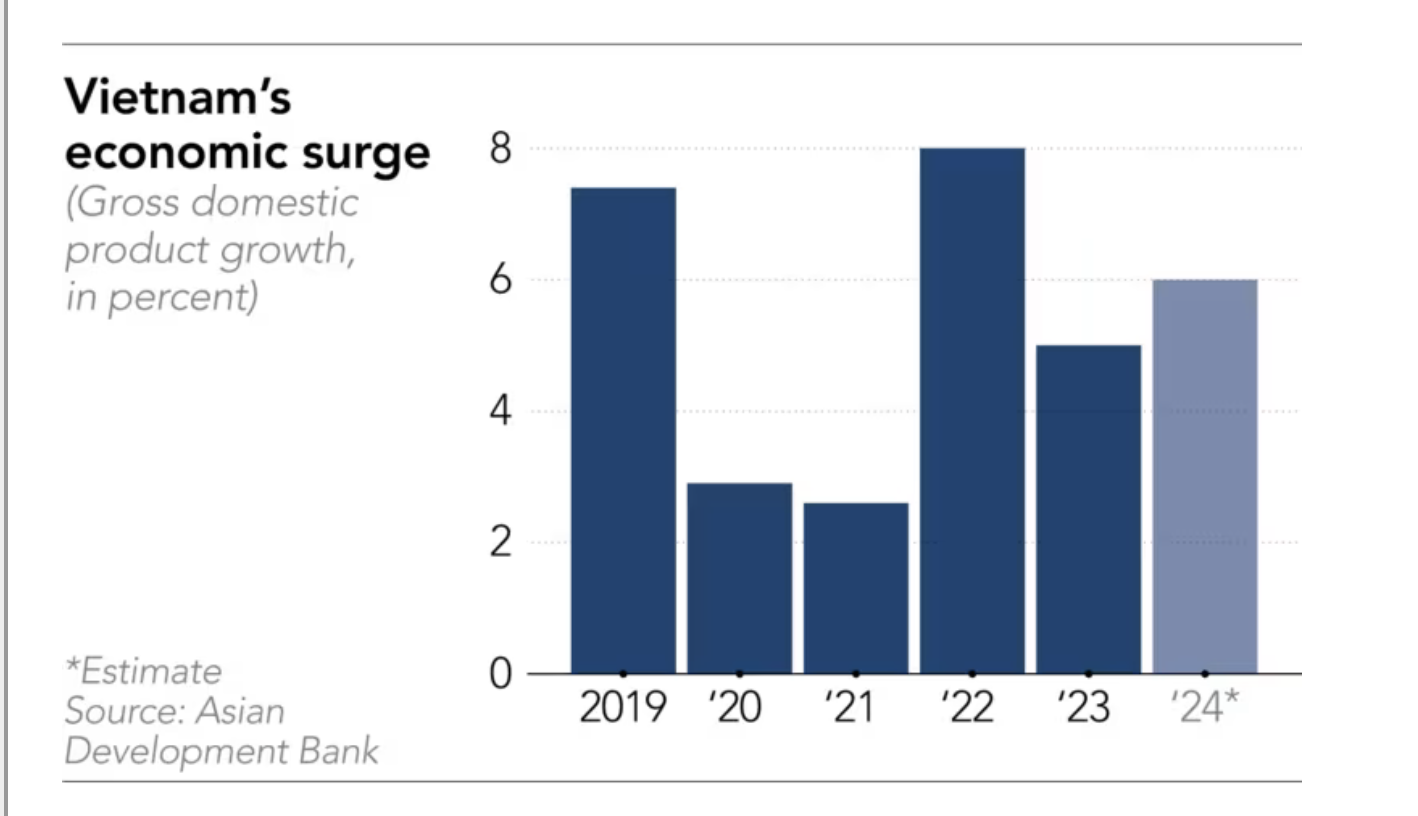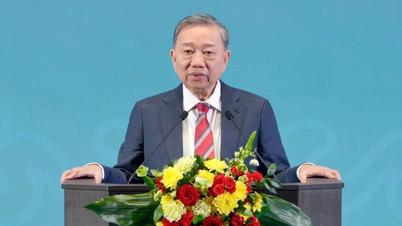Thanks to its open economic policy, attractive investment environment and strategic geographical location, Vietnam is being chosen by leading technology corporations such as Intel, Samsung, Foxconn, and Amkor Technology as a destination for semiconductor manufacturing and assembly.
International news agencies such as Financial Times, Reuters, Bloomberg and Wall Street Journal all highly appreciate the remarkable development of this industry in Vietnam.
People are the foundation
According to Reuters , Vietnam has attracted billions of dollars in investment from major corporations in the semiconductor industry. Foxconn, the world's largest contract electronics manufacturer, has invested $383 million in a printed circuit board factory in Bac Ninh.
The factory is expected to produce 2.79 million products per year, strengthening Vietnam's position in the global supply chain.
Meanwhile, Bloomberg emphasized that as large technology corporations seek to diversify their supply chains and reduce their dependence on China, Vietnam has become the top choice thanks to its competitive production costs and favorable business environment.
For example, Intel has invested more than $1.5 billion in its factory in Ho Chi Minh City, making it the corporation's largest assembly and testing facility globally.

Vietnam has a quality IT workforce with very competitive salaries compared to other countries in the region. Photo: SE
Nikkei newspaper commented that Vietnam has become a "magnet" attracting global semiconductor companies thanks to its talented human resources and reasonable costs.
Alchip Technologies, a leading AI chip design service provider from Taiwan (China), is expanding its R&D team in Vietnam, where it plans to open its first office this year.
The company is likely to increase its headcount to as many as 100 engineers within two to three years, Chief Financial Officer Daniel Wang said.
Explaining the appeal of Vietnam, CEO and Chairman Johnny Shen of Alchip Technologies said, “Vietnam’s promising technical talent pool and strong work ethic make Vietnam a very attractive option for us. We are impressed by the dedication and commitment of Vietnamese engineers who are eager to learn and contribute.”
South Korean companies are also moving to Vietnam, partly to offset the brain drain at home. Vietnam is the country that comes up most frequently in discussions between South Korean business leaders and officials, according to Nikkei.
Having tech talent available during a time of scarcity could help Vietnam achieve its goal of increasing supply chain value. Marvell describes Vietnam as a “strategic location for developing technical talent.”
Brian Chen, an expert at KPMG, said the demand for high-level technical skills in Vietnam is greater than the supply as many companies move to Southeast Asia.
He believes that there is still a lot of room for talent to grow. In the chip design field alone, he believes that each company will recruit at least 300 to 500 people for its Vietnam office.
In addition, compared to Taiwan (China) or Korea, the productivity and salary of engineers in Vietnam are also more attractive factors thanks to cost efficiency.
Mr. Chen pointed out that Ho Chi Minh City is still the number one choice for foreign companies because of its quality of life and vibrancy. Hanoi will be the next destination.

The Asian Development Bank ADB identifies Vietnam as one of the fastest growing economies in recent times.
The Road Ahead
The Vietnamese government has pledged to provide sufficient energy and infrastructure to support the development of the semiconductor industry, the Financial Times reported.
Measures such as tax exemptions, support for infrastructure investment and simplification of administrative procedures have encouraged technology corporations to increase investment in Vietnam.
In addition, Vietnam has implemented the Semiconductor Industry Development Strategy for the 2021-2030 period, aiming to build the country into a leading regional semiconductor chip manufacturing and export center.
The government also promotes public-private partnerships and builds high-tech zones to create a sustainable foundation for the industry.
The Vietnamese government aims to train 50,000 more semiconductor engineers by 2030 through cooperation with large corporations and prestigious universities.
Technical training and internship programs at corporations such as Intel and Samsung have helped many Vietnamese engineers access the most advanced technology.
The Wall Street Journal emphasized that the core factor helping Vietnam succeed is its young, dynamic and highly skilled workforce.
More than 40% of university graduates in Vietnam major in engineering, computer science and information technology. This has created an abundant source of human resources for technology companies in the coming time.
“The high level of interest from Vietnamese students and a trained workforce in semiconductor engineering, combined with government funding and programs, will help establish Vietnam as a semiconductor talent hub,” said Robert Li, Synopsys vice president of sales, Taiwan (China) and Southeast Asia.
From positive reviews from the international press, it can be seen that Vietnam is on the way to becoming a leading semiconductor center in the region and the world.
The combination of strong national strategy, high-quality human resources and continuous investment capital has laid a solid foundation for the sustainable development of this industry.
If it continues to promote existing advantages and overcome existing challenges, Vietnam can completely become one of the most important links in the global semiconductor supply chain in the near future.
Vietnamnet.vn



![[Photo] Prime Minister Pham Minh Chinh chairs the fourth meeting of the Steering Committee for Eliminating Temporary and Dilapidated Houses](https://vphoto.vietnam.vn/thumb/1200x675/vietnam/resource/IMAGE/2025/5/11/e64c18fd03984747ba213053c9bf5c5a)
![[Photo] National Assembly Chairman works with leaders of Can Tho city, Hau Giang and Soc Trang provinces](https://vphoto.vietnam.vn/thumb/1200x675/vietnam/resource/IMAGE/2025/5/11/c40b0aead4bd43c8ba1f48d2de40720e)

![[Photo] The moment Harry Kane lifted the Bundesliga trophy for the first time](https://vphoto.vietnam.vn/thumb/1200x675/vietnam/resource/IMAGE/2025/5/11/68e4a433c079457b9e84dd4b9fa694fe)






























































































Comment (0)